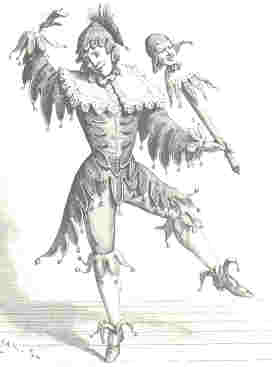Annotation:Happy Clown (The): Difference between revisions
No edit summary |
No edit summary |
||
| Line 2: | Line 2: | ||
{{TuneAnnotation | {{TuneAnnotation | ||
|f_tune_annotation_title= https://tunearch.org/wiki/Annotation:Happy_Clown_(The) > | |f_tune_annotation_title= https://tunearch.org/wiki/Annotation:Happy_Clown_(The) > | ||
|f_annotation=[[File:Happyclown.jpg|right|400px|thumb|]]'''HAPPY CLOWN'''. AKA and see "[[I'm like a skiff on the ocean tossed]]," "[[One evening having lost my way]]," "[[Walpole]]," "[[Walpole or the Happy Clown]]." English, Air (6/8 time). E Flat Major (Chappell): G Major (Aird, Walsh). Standard tuning (fiddle). One part (Chappell): AB (Walsh): AABB (Aird). The tune appears in the 1718 and 1728 editions of Playford's '''Dancing Master''', Walsh's '''Compleat Country Dancing Master''', and many ballad operas and broadside sheets (often as "Walpole, or The Happy Clown"). Stenhouse (in commentary on the '''Scots Musical Museum''') claims to have had a manuscript version from 1709. Allan Ramsay employed the air in '''Gentle Shepherd''', and it was used as the vehicle for a song in John Gay's '''Beggar's Opera''' (1729, air XLVII), with words beginning "I'm like a skiff on ocean toss'd." Irish versions of the tune appear in Stanford-Petrie ('''Complete Collection''', 1905, Nos. 1397 and 1398) under the title "[[Is Truagh Mar' Chonairc Mé Aén Bhean a-Ríamh]]" ([['Tis pity I e'er saw a woman]]), in which two bars correspond to one bar in the older English sets. | |f_annotation=[[File:Happyclown.jpg|right|400px|thumb|]]'''HAPPY CLOWN'''. AKA and see "[[I'm like a skiff on the ocean tossed]]," "[[One evening having lost my way]]," "[[Walpole]]," "[[Walpole or the Happy Clown]]." English, Air (6/8 time). E Flat Major (Chappell): G Major (Aird, Walsh): G Mixolydian (Young). Standard tuning (fiddle). One part (Chappell): AB (Walsh): AABB (Aird, Young). The tune appears in the 1718 and 1728 editions of Playford's '''Dancing Master''', Walsh's '''Compleat Country Dancing Master''', and many ballad operas and broadside sheets (often as "Walpole, or The Happy Clown"). Stenhouse (in commentary on the '''Scots Musical Museum''') claims to have had a manuscript version from 1709. Allan Ramsay employed the air in '''Gentle Shepherd''', and it was used as the vehicle for a song in John Gay's '''Beggar's Opera''' (1729, air XLVII), with words beginning "I'm like a skiff on ocean toss'd." Irish versions of the tune appear in Stanford-Petrie ('''Complete Collection''', 1905, Nos. 1397 and 1398) under the title "[[Is Truagh Mar' Chonairc Mé Aén Bhean a-Ríamh]]" ([['Tis pity I e'er saw a woman]]), in which two bars correspond to one bar in the older English sets. | ||
|f_source_for_notated_version= | |f_source_for_notated_version= | ||
|f_printed_sources=Aird ('''Selections of Scotch, English, Irish and Foreign Airs''') | |f_printed_sources=Aird ('''Selections of Scotch, English, Irish and Foreign Airs, vol. II'''), 1785; No. 156, p. 57. Chappell ('''Popular Music of the Olden Times, vol. 2'''), 1859; pp. 108-109. Johnson ('''Scots Musical Museum'''), 1787-1803; No. 251. Oswald ('''Caledonian Pocket Companion, Book 7'''), 1760; p. 7. Walsh ('''Complete Country Dancing-Master, Volume the Fourth'''), London, 1740; No. 26. David Young ('''A Collection of Scotch Airs with the latest Variations Book II''', AKA – The McFarlane Manuscript), c. 1741; No. 158, p. 215. | ||
|f_recorded_sources= | |f_recorded_sources= | ||
|f_see_also_listing= | |f_see_also_listing= | ||
}} | }} | ||
Latest revision as of 22:18, 24 September 2023
X:1 T:Happy Clown M:6/8 L:1/8 N:”Longways for as many as will.” B:John Walsh – Complete Country Dancing-Master, Volume the Fourth B: (London, 1740, No. 26) Z:AK/Fiddler’s Companion K:G d|G2A B>AG|d2d d2g|f2e d2c|B2A G2d| G2A B>AG|d2d d2g|f2e e2d|(d3 d2)|| d|dBc d>ed|c2B c3|cAB c>dc|B2A B2d| g2d g2d|(g3 g>)fe|dcB A2G|G3 G2||


